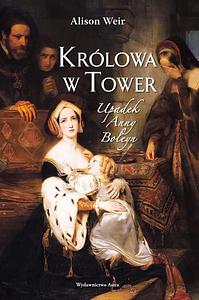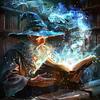Take a photo of a barcode or cover
I'm in to this time period anyway, but I enjoyed this. It's a more complete view of Anne Boleyn than we usually get. She was a complicated figure. Devious and shallow but also determined and heroic. Slow read, but I thought it was worth it.
I think the Tudor period of history is my favourite. I knew a lot of the theories and evidence in this book but it was still interesting to read an analysis of Anne Boleyn’s downfall that purely concentrated on that subject. It was well written and obviously well researched and appeared fairly impartial. I recommend it, go read.
Meticulous attention to detail and facts. Fascinating. I enjoy Ms Weir’s bit of snark that comes out out occasion where she’ll state that some fact that has been asserted by another historian can’t be true (and then effectively explains why).
Anne Boleyn. Queen. Woman. Wife. Mother. Adulterous? Alison Weir tries to recount the last months and years after the death of Anne. It is quite an interesting read. Tedious at times with all of the back tracking that is done to explain something that happened, but other than that it brought to light and made clear the argument that she was fasely accused, that or as she states in the last chapter, "maybe some evidence that would prove damning was destroyed." But this book just proved to me that she was wrongly convicted and that Henry VIII just wanted a new wife. IF Anne really had that female blood pregnancy problem then that just proves the birthing of still born sons was as much Henry's fault as hers.
A lot of great information about Anne Boleyn but it was too textbook like for my taste. Not a light read but filled with interesting and great information if you want to know more or are studying Anne.
It was a fairly enjoyable and quick read, but after years as a history student, I've grown too accustomed to the style of academic historians and found this book a bit disappointing. There were a lot of points where Weir made assertions to the effect of, "You always thought this, but you were WRONG! Haha!" and then didn't support them (my favorite was the discussion of whether or not yellow was the color of mourning in Spain at the time of Katherine of Aragon's death. Weir dispatched of it with a handy (paraphrased), "Popular misconception has it that yellow was the color of mourning in Spain at the time. It wasn't." No explanation, no footnotes, nothing.).
Moreover, I felt that she identified too closely with certain individuals and made too many assertions about what somebody "must" have been feeling at the time or "must" have realized. If there's one thing about humans that students of history tend to learn early on, it's that people often don't think and do what we expect of them. I'm always wary of history books that claim to assert knowledge of the thoughts or feelings of individuals, unless there is a footnote directly at the end of the sentence pointing to some original source material to back it up.
Still, for all my criticisms, I did devour the book pretty quickly, and that alone is a good sign. It's a fun read, and perhaps my discomfort with its stylistic elements is a bit silly or pretentious or what have you, and I should just get over it and have some fun.
But then, it's hard to beat ten years of training out of one's head on a moment's notice.
Moreover, I felt that she identified too closely with certain individuals and made too many assertions about what somebody "must" have been feeling at the time or "must" have realized. If there's one thing about humans that students of history tend to learn early on, it's that people often don't think and do what we expect of them. I'm always wary of history books that claim to assert knowledge of the thoughts or feelings of individuals, unless there is a footnote directly at the end of the sentence pointing to some original source material to back it up.
Still, for all my criticisms, I did devour the book pretty quickly, and that alone is a good sign. It's a fun read, and perhaps my discomfort with its stylistic elements is a bit silly or pretentious or what have you, and I should just get over it and have some fun.
But then, it's hard to beat ten years of training out of one's head on a moment's notice.
One reason I love reading books about the queenship of Anne Boleyn is that they are just as much a history of law as they are a history of the monarchy. As conniving and dark as Cromwell's mind must have been, he is, without a doubt, an unbelievably brilliant man whose ability in legal manipulation could almost be seen as anachronistic if the sources of that spring were not so plentiful.
Alison Weir certainly used every single one of these sources to compile the research presented in The Lady in the Tower. I may be mistaken, but I think some of the arguments in this book, both for and against Anne's innocence, may have been original (I had never read a book about Anne in which the historian actually traced Anne's movements on the dates she apparently was supposed to be engaging in affairs to provide her with an alibi for those specific dates). Again, I might be mistaken.
Even though Weir rightfully assumes that Anne was innocent of what the prosecution accused her, nowhere in the book does Weir definitively state that Anne was definitely innocent of everything. To me, any author that states Anne's innocent or guilt definitively loses all credibility. Although she states that there is a "very strong presumption" that Anne is innocent, Weir suggests cases for both Anne's innocence as well as her guilt. Certainly a mark of a responsible historian.
Side note: After looking at the page count, I was a little worried that this book would suffer from one of the worst sins of popular history: spending nearly the first half of the book setting up context or recounting the entire lives of the subject's parents. You know, the chapters that no one wants to read because, if they wanted to read a recounting of Henry and Catherine's reign, they would have picked up a book about just that. Weir skips all this foreplay and spends the entire book on the titular subject.
Three huge thumbs up in my eyes.
Alison Weir certainly used every single one of these sources to compile the research presented in The Lady in the Tower. I may be mistaken, but I think some of the arguments in this book, both for and against Anne's innocence, may have been original (I had never read a book about Anne in which the historian actually traced Anne's movements on the dates she apparently was supposed to be engaging in affairs to provide her with an alibi for those specific dates). Again, I might be mistaken.
Even though Weir rightfully assumes that Anne was innocent of what the prosecution accused her, nowhere in the book does Weir definitively state that Anne was definitely innocent of everything. To me, any author that states Anne's innocent or guilt definitively loses all credibility. Although she states that there is a "very strong presumption" that Anne is innocent, Weir suggests cases for both Anne's innocence as well as her guilt. Certainly a mark of a responsible historian.
Side note: After looking at the page count, I was a little worried that this book would suffer from one of the worst sins of popular history: spending nearly the first half of the book setting up context or recounting the entire lives of the subject's parents. You know, the chapters that no one wants to read because, if they wanted to read a recounting of Henry and Catherine's reign, they would have picked up a book about just that. Weir skips all this foreplay and spends the entire book on the titular subject.
Three huge thumbs up in my eyes.
As always, Weir writes a compelling non-fiction account of the Tudor Era
Overrall I thought this book was alright, but it read a little too much like a textbook to me. I have read one of Weir's fiction books and enjoyed it, so maybe her non-fiction just isn't for me.
Basically, Weir presents the case that Anne Boleyn and her fellow accused were framed by Cromwell (not Henry). She is of the firm belief that Cromwell was the catalyst for Anne's fall, and planned the whole thing for mostly political reasons. She presents numerous facts, excerpts, and testimony which makes her argument very convincing, so she definitely backs up her theory that Anne was innocent.
Just as a side note, the book is shorter than it appears. The last 100 pages or so of the book are notes for all the references Weir makes in the text.
Basically, Weir presents the case that Anne Boleyn and her fellow accused were framed by Cromwell (not Henry). She is of the firm belief that Cromwell was the catalyst for Anne's fall, and planned the whole thing for mostly political reasons. She presents numerous facts, excerpts, and testimony which makes her argument very convincing, so she definitely backs up her theory that Anne was innocent.
Just as a side note, the book is shorter than it appears. The last 100 pages or so of the book are notes for all the references Weir makes in the text.




